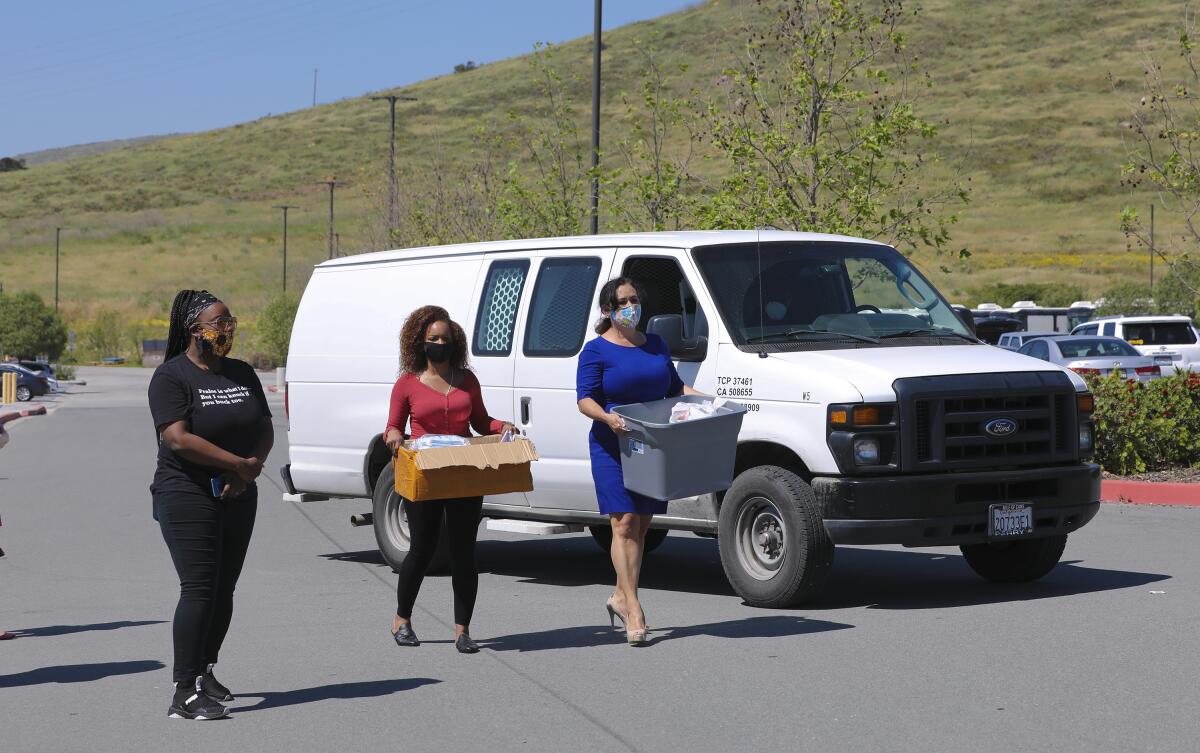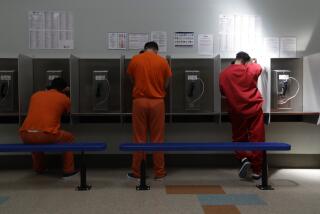Assemblywoman with mask donation is turned away from San Diego immigration detention center

Coronavirus: StateAssemblywoman Lorena Gonzalez brought about 1,000 masks to donate to detainees at Otay Mesa Detention Center but was turned away.
SAN DIEGO — Staff at Otay Mesa Detention Center did not allow Assemblywoman Lorena Gonzalez to donate masks to help protect detainees from the COVID-19 outbreak when she showed up at the facility‘s gate Friday.
Gonzalez, whose district includes the detention center, joined with several immigrant rights organizations to gather about 1,000 masks to give to detainees who said they weren’t receiving adequate protection from the novel coronavirus.
“It’s rare that I feel so powerless to change something in my community and my district,” said Gonzalez (D-San Diego) said.
“These are human beings,” she said. “We don’t have mass deaths, but we know where this is going.”
She said that if Otay Mesa weren’t a detention facility, society would be calling for it to close immediately over its handling of the virus’ spread within its walls.
Otay Mesa Detention Center, run by private prison company CoreCivic, has the highest number of coronavirus cases among immigrant detainees in the nation, and the facility has helped push its ZIP Code to the highest count of cases in the county.
As of Friday evening, at least 111 people in custody had tested positive for the virus, according to facility documents. Of those, 67 are in Immigration and Customs Enforcement custody, meaning they are not being held for criminal reasons but instead waiting for immigration court cases or to be deported. The other 44 are U.S. Marshals Service inmates who are in criminal custody.
According to the documents, 17 CoreCivic staffers and eight medical staffers had also tested positive for the virus. ICE’s website says that eight of its employees at the facility have tested positive. It’s not clear whether that includes any of the medical staff.
When Gonzalez and the family member of a detainee tried to carry the boxes of masks to Otay Mesa’s entrance, they were stopped by a guard in a van and sent back to the edge of the parking lot. Gonzalez tried to call the warden and his assistants, but the person who answered the telephone wouldn’t connect her to them, she said.
Leaving the masks behind, Gonzalez went inside. About 10 minutes later, she walked back out. She hadn’t been allowed to speak to any of the building’s officials.
Gonzalez said she plans to keep trying to donate the masks.
ICE and the U.S. Marshals Service did not respond to requests for comment. CoreCivic deferred to ICE.
Both ICE and CoreCivic have said that they are following national guidelines to care for people held at Otay Mesa.
Detainees and those who advocate for them have been complaining for weeks that the facility is not doing enough to protect them.
At first, they didn’t receive any protective gear. When they did get masks, they came with contracts that many refused to sign. Later, the detainees were given masks anyway.
They are disposable surgical masks. Many detainees say they’ve been wearing the same one for weeks, with no replacements.
When asked about the issue, CoreCivic spokeswoman Amanda Gilchrist said, “New masks have been handed out.”
Detainees say they don’t have enough soap and that they don’t have enough space to keep at least six feet from one another.
“This is ICE and CoreCivic’s responsibility, and they are failing,” said Mindy Pressman of Otay Mesa Detention Resistance, one of the groups that helped gather masks.
Soon after the advocates left, several San Diego County sheriff’s deputies arrived. The driver of one of the patrol cars parked inside the gate to watch for any additional activity.
Morrissey writes for the San Diego Union-Tribune.
More to Read
Updates
3:38 p.m. April 25, 2020: This story has been updated with a statement from ICE and additional comment from CoreCivic.
Sign up for Essential California
The most important California stories and recommendations in your inbox every morning.
You may occasionally receive promotional content from the Los Angeles Times.











